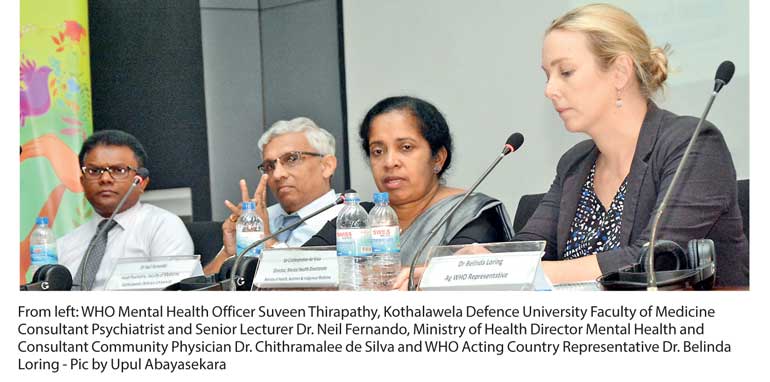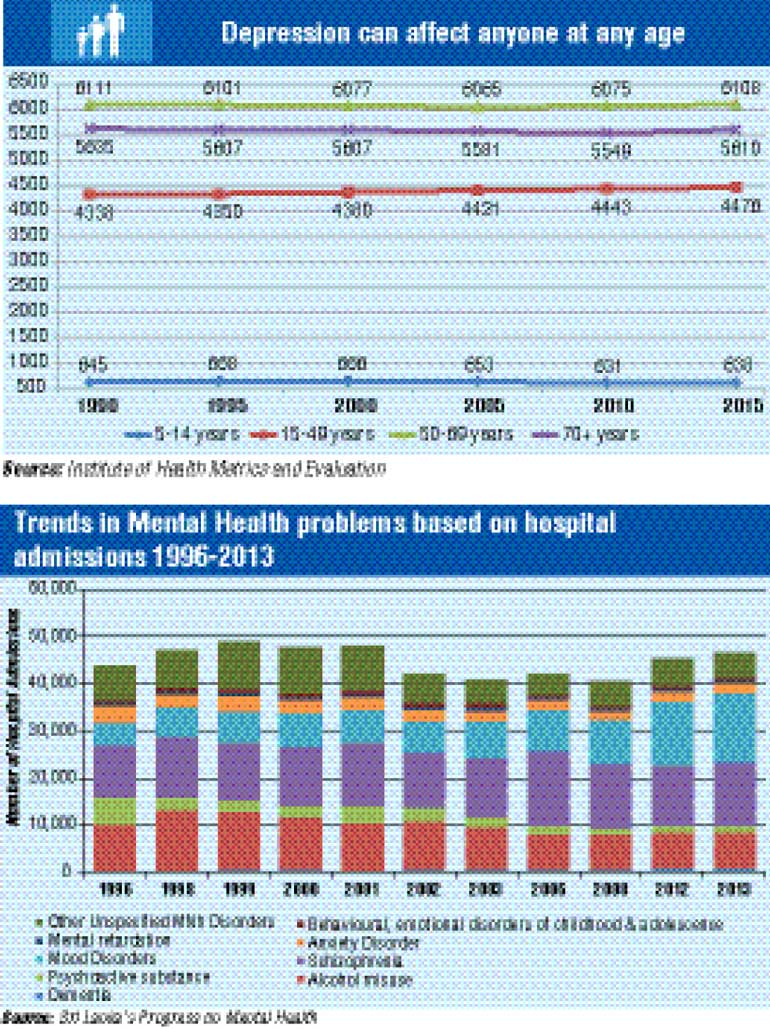Tuesday Feb 17, 2026
Tuesday Feb 17, 2026
Wednesday, 24 May 2017 00:00 - - {{hitsCtrl.values.hits}}

By Fathima Riznaz Hafi
Depression is a growing concern in Sri Lanka with an estimated 800,000 suffering from the illness.
Characterised by persistent sadness and a loss of interest in activities that one normally enjoys, accompanied by an inability to carry out daily activities for at least two weeks, depression can range from mild, moderate, or severe, depending on the number and severity of symptoms.
Though treatment is available it is only sought by a few patients while the rest stay away out of shame resulting in the anguish of the patient escalating.
“People are suffering unnecessarily. 350 million people world-wide are suffering from depression and that rate is growing. It’s growing so much that depression is now considered by WHO to be the leading cause of disability worldwide – more than any other condition. More importantly, now depression can be easily treated and managed. People don’t need to suffer in silence. Unfortunately the biggest barrier to people getting the right care that would help them live a normal, happy life is stigma; it is misinformation and myths,” says WHO Acting Country Representative Dr. Belinda Loring.
“WHO estimates that in Sri Lanka over 800,000 people currently have depression – that’s almost a million – men, women, children, elderly – and what’s even more alarming is that so many of these people are living without seeking the help that they need. Depression and treatment for depression have come a long way. Most people with depression can be managed without medicine and those that do need medicine can be managed safely in the communities and go about living their normal lives, go to school and work. Our vision for this year’s World Health Day is that all people with depression, in all countries, can both seek and get the help they need.”
Dr. Loring was speaking at a media seminar organised by WHO and the health ministry recently, to announce their plans to tackle depression, highlighting key facts on depression and what the public can do to help.
Also at the seminar was WHO Mental Health Officer Suveen Thirapathy, who says the portion of the population who does not suffer from depression cannot afford to turn a blind eye on the portion that does because the effects of depression go beyond the sufferer alone – depression affects us all. Referring to WHO research he noted that depression harms economies through increased health costs for governments, lower productivity and employee absenteeism. At worst, depression can lead to suicide. This brings loss to family members, friends and one’s community.
He stated that if the general public is better informed about depression, its symptoms and possible consequences, and what services are available for prevention and treatment, they would be in a better position to help those who are lost and need guidance.
Family, friends and colleagues of people living with depression especially play a major role as they are in a strong position to provide support if they are educated on the illness.
 Symptoms of depression both sufferers and the public need to be alert of include sadness, loss of energy, change in appetite, sleeping more or less, anxiety, reduced concentration, indecisiveness, restlessness, feeling of worthlessness, irritability, feelings of self-harm or suicide, loss of interest in activities, and aches and pains without a physical cause. Thirapathy says people with depression normally have several of these symptoms for at least two weeks.
Symptoms of depression both sufferers and the public need to be alert of include sadness, loss of energy, change in appetite, sleeping more or less, anxiety, reduced concentration, indecisiveness, restlessness, feeling of worthlessness, irritability, feelings of self-harm or suicide, loss of interest in activities, and aches and pains without a physical cause. Thirapathy says people with depression normally have several of these symptoms for at least two weeks.
Reiterating that there is effective treatment for depression but most people don’t receive them, Thirapathy added that mild depression can be treated without medicine while moderate or severe depression may need medication and psychological treatment such as cognitive behavioural therapy and psychotherapy.
Kotelawala Defence University Faculty of Medicine Consultant Psychiatrist and Senior Lecturer Dr. Neil Fernando explaining that negative thoughts could lead to negative emotions which in turn could lead to negative behaviour; advised that the best treatment for depression is to talk about it. Talking not only spreads awareness on the problem but also helps get rid of the stigma.
Depression is not a new condition; neither is it uncommon he said, naming famous people who also suffered from depression, going as far back as Abraham Lincoln, Winston Churchill, Edwin Aldrin and Beethoven and he also mentioned local actress Anoja Weerasinghe.
He spoke of people who are vulnerable to depression, first mentioning women when they are pregnant and after confinement saying that within the first 45 days the healthcare staff should identify whether they are suffering from depression. Post-partum depression can escalate so badly that it can lead to the mothers committing suicide.
He then mentioned students who can be subjected to stress arising from difficulties in performance and other school-related issues that can lead to depression and suggested that the teacher is the ideal person whom they can talk to.
He further noted that while women tend to talk to their close friends or colleagues about their emotions and problems, men tend to hide their disorders and instead turn to alcohol.
The elderly is another section of the population prone to depression owing to loneliness. After the age of 60 depression is most common among the elderly; therefore it is very important to identify and talk to them. They have no one to talk to and feel isolated and alone.
If left unattended depression is a disabling illness – hence he stressed the need to raise awareness and be attentive to symptoms in vulnerable people.
Not waiting for the worst case scenario, prevention would save a person from a lot of pain and anguish. Dr. Fernando suggested the following steps to prevent the illness getting worse:
1. Early recognition: He said that depression is often recognised late and therefore raising awareness would be highly beneficial in early detection
2. Stay connected: Noting that close ties with loved ones provide immense support he encouraged them to talk to family and friends.
3. Seek professional help: Many are reluctant to seek help because of social stigma related to this disorder. The stigma should be broken and professional help should be sought as this could put them on the road to recovery
4. Daily physical exercise: He recommends walking 30 minutes per day as this stimulates certain chemical reactions in the brain that will lead to decline in depression level and he suggested that it is better to exercise in the morning as it will help us to be lively throughout the day. Walking produces endorphins in the brain and this feel-good hormone will reduce negative emotions, he explained.
5. Engage in useful activity: They want to stay home and not get off bed but that makes it worse. They must go out and enjoy themselves. They tend to keep quiet and idle – we have to encourage them to do the opposite.
Though the battle is on-going and there is a long road ahead, Sri Lanka ranks high among Asian countries, on improving mental health services. Speaking on Sri Lanka’s development on mental health at the seminar, Ministry of Health Director Mental Health and Consultant Community Physician Dr. Chithramalee de Silva said Sri Lanka has a long history of mental health services. In 1839 Governor Mackenzie introduced an ordinance to establish lunatic asylums, in 1943 the first neuropsychiatric clinic was opened at the Colombo National Hospital and in 1926 the Mental Hospital Angoda was opened.
Efforts are on-going and present strategies in mental health include:
Mental healthcare provision consists of 69 consultant units, 39 acute psychiatry in-patient units, 17 intermediate care units, 5 long stay units, 212 divisional mental health and outreach clinics and 8 alcohol rehabilitation centres.
Programs and activities of various forms should be incorporated in places where they would be most beneficial in efforts to promote mental health. Dr. de Silva says schools would benefit from life skills development, while the workplace would benefit from stress management, mindfulness programs and social activities; for the elderly – religious and social activities/day care centres are helpful, and for pregnant mothers – maternal mental health promotion, early childhood care and development should be a focus. She also suggested promoting mental relaxation at the workplace and in schools and even at kindergarten.
“Investing in mental health today can generate enormous returns in terms of reducing disability and preventing premature death. The priorities are well known. It is our responsibility to turn the possibilities to reality,” she stressed.
In attempts to tackle depression, WHO is leading an international year-long campaign to highlight depression, encouraging more people to seek help and recover. It has chosen the theme ‘Depression – let’s talk’ and this theme is appropriately based on the fact that the number of people around the world suffering from depression is rising but a notably low number seeks help, owing largely to stigma and lack of awareness.
Working together with the Ministry of Health it is planning out a series of events, addressing the public at large, with the aim to generate a conversation about questions related to depression.
The first event in the series was held on World Health Day which fell on 7 April. It was a positive event, focussing on promoting mental well-being through a range of activities which included art and music therapy, yoga and drama.
The campaign will continue with a series of activities that will involve training teachers and front-line health workers on how to detect and manage depression and where to get appropriate help and this will end on 10 October, which is ‘World Mental Health Day’.